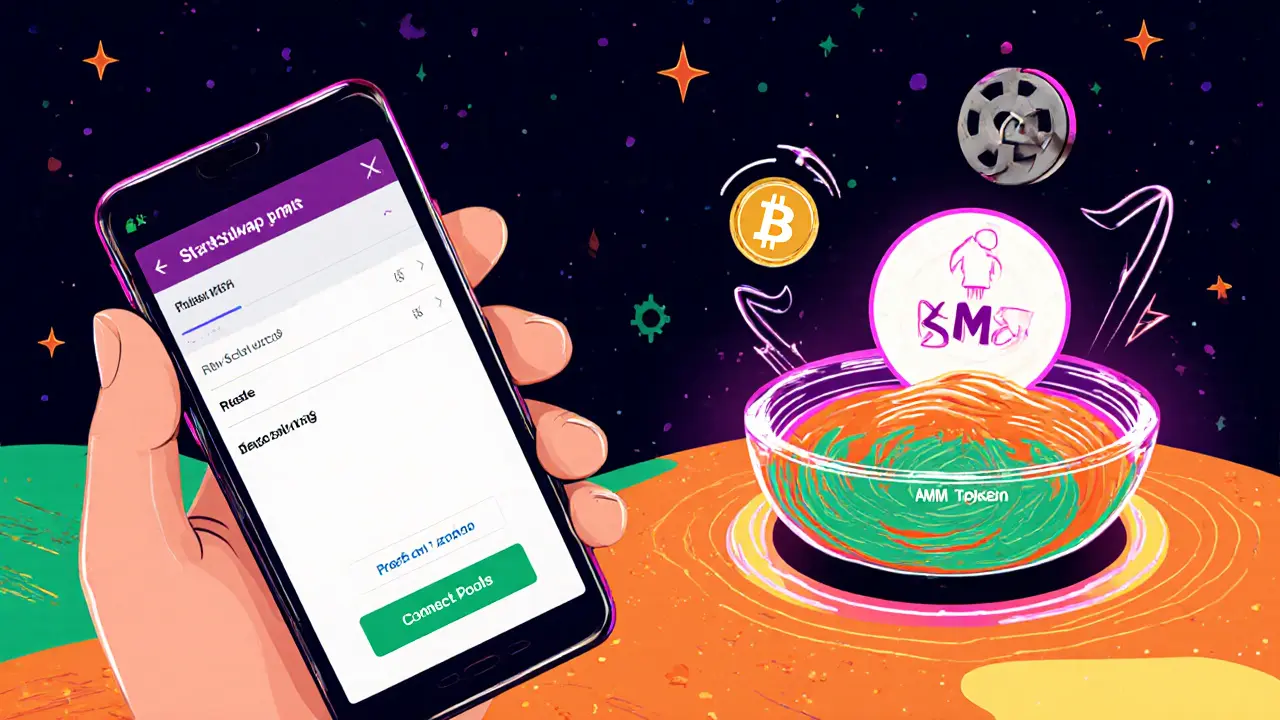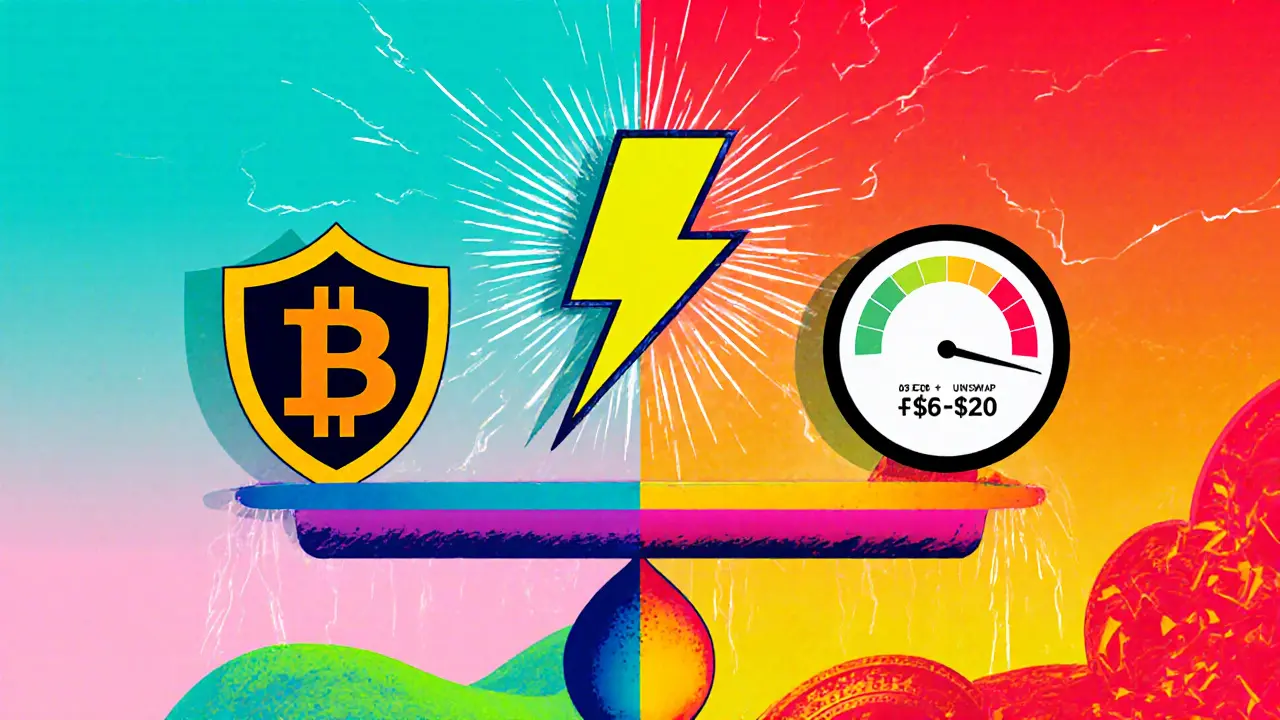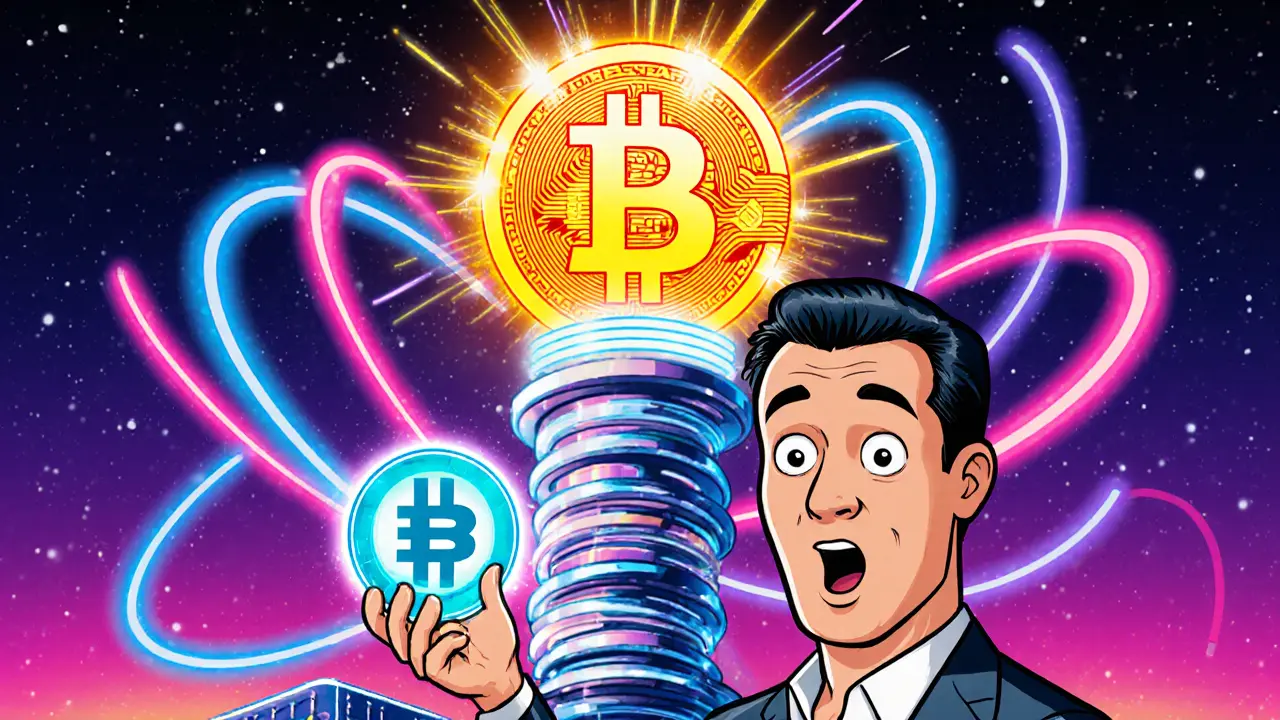StackSwap Fee Calculator
Calculate Your Trade Fees
Compare StackSwap fees against Uniswap and PancakeSwap for any trade amount
If you’ve been hunting for a decentralized exchange that leans on Bitcoin’s security rather than Ethereum’s sprawling ecosystem, you’ve probably stumbled across StackSwap a permission‑less DEX built on the Stacks layer‑2 solution that settles on Bitcoin. In short, StackSwap promises Bitcoin‑backed DeFi without the high gas fees that plague many Ethereum‑based platforms, but does it deliver on that promise? This 2025 review breaks down the tech, tokenomics, user experience, and where it stands against the big DEXs you already know.
What Makes StackSwap Different?
Most DEXs you hear about-Uniswap, PancakeSwap, SushiSwap-run on smart‑contract‑friendly chains like Ethereum or BSC. Stacks blockchain a layer‑2 protocol that anchors its blocks to Bitcoin’s immutable ledger flips that model. By anchoring to Bitcoin, StackSwap inherits Bitcoin’s proof‑of‑work security while offering a smart‑contract environment for DeFi.
From a user’s perspective, the big differences are:
- Transactions settle on Bitcoin, giving you the same finality and resistance to censorship as a Bitcoin transaction.
- Fees are paid in STX (Stacks’ native token) instead of ETH or BNB, which typically means lower costs during network congestion.
- The platform runs an Automated Market Maker (AMM) model, similar to other DEXs, but all pools are paired with STX or other Bitcoin‑anchored assets.
How the StackSwap Engine Works
The core of StackSwap is its Automated Market Maker (AMM) a set of smart contracts that price assets based on pool ratios instead of order books. When you add liquidity, you deposit a pair of tokens-usually STX and a newer asset-into a pool. The AMM algorithm adjusts prices automatically as traders swap tokens.
Before you can trade, you need a Hiro Wallet a browser‑extension and mobile wallet designed for Stacks‑based applications. Hiro stores your private keys, signs transactions, and communicates with the Stacks network. The onboarding flow looks like this:
- Install Hiro Wallet (Chrome, Firefox, or mobile app).
- Fund the wallet with a small amount of STX for transaction fees.
- Connect the wallet to the StackSwap UI by clicking “Connect Wallet”.
- Swap, add liquidity, or stake STSW directly from the dashboard.
The requirement for Hiro adds a slight learning curve compared with MetaMask, which works across dozens of chains, but it’s the only way to interact securely with Stacks‑based contracts.
Tokenomics: The Role of STSW
StackSwap’s native governance token, STSW token a utility token used for voting, staking rewards, and protocol incentives on the StackSwap platform, serves three core functions:
- Governance: Holders can vote on protocol upgrades, fee structures, and new feature rollouts.
- Staking rewards: Liquidity providers earn a portion of transaction fees plus extra STSW emissions.
- Incentives: Developers can lock STSW to receive priority listing for their tokens.
Supply‑side details: total max supply is 100 million STSW, with 45 % allocated to community incentives, 20 % to the development fund, 15 % to early investors, and the remaining 20 % released via a gradual emission schedule. As of August 2024, the token’s market cap hovered around $620 million, reflecting strong interest from Bitcoin‑centric DeFi enthusiasts.
Performance, Fees, and Security
The biggest selling point is security. Because every Stacks block is cryptographically linked to a Bitcoin block, an attacker would need to compromise Bitcoin’s proof‑of‑work to tamper with StackSwap contracts-a practically impossible feat. This security model earned StackSwap the #1 spot for “Bitcoin‑based DeFi” in a Coin Bureau ranking (Oct 2024).
Fees are simple: a 0.30 % swap fee (standard for AMMs) plus a small network fee paid in STX. Compared to Uniswap’s typical 0.30 % plus Ethereum gas that can spike above $20 during congestion, StackSwap’s total cost per trade is usually under $1 for a $1,000 swap, even during peak Bitcoin activity.
Speed is decent; a swap finalizes after the underlying Stacks block is confirmed, which averages about 10-12 seconds. This is slower than the near‑instant confirmation on some Layer‑2 rollups, but the trade‑off is the added security of Bitcoin finality.
How It Stacks Up: Comparison Table
| Metric | StackSwap | Uniswap | PancakeSwap |
|---|---|---|---|
| Total Value Locked (TVL) | $406 M | $6.2 B | $1.8 B |
| Settlement Layer | Bitcoin (via Stacks) | Ethereum | Binance Smart Chain |
| Swap Fee | 0.30 % + STX gas | 0.30 % + ETH gas | 0.20 % + BNB gas |
| Average Gas Cost (USD) | ~$0.40 | ~$12‑$20 | ~$0.15 |
| Token Governance | STSW | UNI | CAKE |
| Cross‑Chain Swaps | No (Bitcoin‑only) | Limited (via bridges) | Limited (via bridges) |
Numbers show that StackSwap is a niche player, but its low fees and Bitcoin‑rooted security make it attractive for a specific audience.

Pros and Cons
Pros
- Bitcoin‑level security and finality.
- Low transaction costs compared with Ethereum DEXs.
- AI‑driven performance optimization (as reported by Blockchain‑Ads, Aug 2024).
- Permissionless token listings, encouraging innovative Bitcoin‑anchored projects.
Cons
- Limited to the Stacks ecosystem - no native cross‑chain swaps.
- Liquidity is modest; large trades can cause noticeable slippage.
- Onboarding requires Hiro Wallet, which is less familiar to mainstream users.
- Customer support is community‑driven (Discord, GitHub) with no 24/7 helpdesk.
Regulatory Landscape
Because StackSwap is a permissionless protocol, it technically operates outside traditional exchange licensing. However, its Bitcoin foundation could attract regulators focused on “stablecoins” and “decentralized finance” rather than the usual Ethereum‑centric scrutiny. As of late 2025, no major jurisdiction has issued a specific ruling on Stacks‑based DEXs, but the broader trend of tightening AML/KYC rules could eventually impact on‑ramps that feed STX into fiat.
User Experience: What Real Traders Say
Public reviews are sparse, but the few Reddit threads that discuss StackSwap highlight two themes: enthusiasm for Bitcoin DeFi and frustration over the learning curve. Users appreciate the clean UI-similar to Uniswap’s design-but note that “you need at least 0.001 STX for gas, and the wallet prompts can be cryptic for newcomers.” Institutional adoption is hinted at by mentions that projects like Compound and Defiway use StackSwap for liquidity, yet retail volume remains low compared with the giants.
Future Outlook
StackSwap’s growth hinges on the adoption trajectory of the Stacks layer‑2. If Stacks captures even 5 % of the DeFi market by 2027 (as some analysts predict), StackSwap could see TVL rise above $2 billion, narrowing the gap with larger DEXs. The platform’s roadmap includes adding more wallet integrations-potentially supporting Ledger hardware wallets-and refining AI models that predict optimal pool incentives. However, a bearish outlook points to Stacks’ price volatility (down ~5 % in the week before Oct 2024) and the risk that Bitcoin purists might stay away from any “smart contract” activity.
For now, StackSwap serves a focused community: Bitcoin maximalists who want DeFi without leaving the Bitcoin security zone. If that description matches your goals, the platform is worth a test trade.
Bottom Line
StackSwap isn’t trying to replace Uniswap; it’s carving out a specialized corner of the DEX world where Bitcoin’s security matters more than massive liquidity. Its fee structure, governance token, and AI‑enhanced engine make it a solid option for the right audience, but newcomers should brace for a steeper onboarding process and limited asset variety.

Do I need Bitcoin to use StackSwap?
No, you only need STX for transaction fees. You can acquire STX on any major exchange, then move it to Hiro Wallet to start swapping.
How does StackSwap’s security compare to Ethereum DEXs?
StackSwap inherits Bitcoin’s proof‑of‑work finality via the Stacks layer‑2, making it harder to compromise than most Ethereum‑based contracts, which rely on a different consensus model.
Can I list my own token on StackSwap?
Yes. StackSwap is permissionless - you create a liquidity pool with STX and your token, then lock a portion of STSW for governance voting if you want community visibility.
What are the typical fees for a $1,000 trade?
The swap fee is 0.30 % ($3) plus a small STX network fee, usually under $0.50, so you’ll pay roughly $3.50 total.
Is there 24/7 customer support?
Support is community‑based via Discord and a GitHub issue tracker. There’s no dedicated live‑chat or phone line.

Write a comment